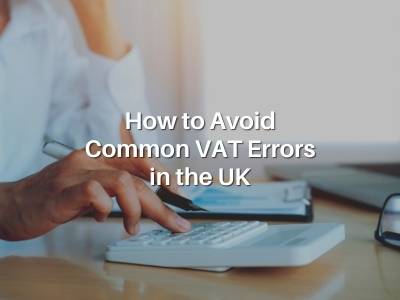Fix Common VAT Errors in the United Kingdom
 VAT are taxes levied on products when they value-added to each stage in the supply chain. Unlike sales tax, VAT is charged from one purchaser to another, such as retailers, manufacturers or distributors – throughout the process until an end-user, the customer, buys the product. Every year, many people make a mistake when filing their VAT returns in the United Kingdom. See our guide on how to avoid common VAT errors in the United Kingdom below!
VAT are taxes levied on products when they value-added to each stage in the supply chain. Unlike sales tax, VAT is charged from one purchaser to another, such as retailers, manufacturers or distributors – throughout the process until an end-user, the customer, buys the product. Every year, many people make a mistake when filing their VAT returns in the United Kingdom. See our guide on how to avoid common VAT errors in the United Kingdom below!
How Do These VAT Errors Occur?
A majority of VAT errors result from subpar or poor record-keeping. Business owners who do not have a standardised way of storing and record-keeping will most like suffer the ramifications of VAT errors. Besides that, business owners tend not to ensure the details are correct before submitting and sending the wrong information or calculation. Plus, some people are oftentimes confused with terms such as zero rate, standard rated and exempt purchases. This leads to over-adding or subtracting in the returns, causing VAT errors.
What Happens if I Send in a Wrongly Recorded VAT Return?
Her Majesty’s Revenue and Customs (HMRC) are very stringent with VAT returns; a single mistake can cost you to be penalised. You could be fined from 15% to 100% of the VAT due on top of the payable taxes; nevertheless, this applies to VAT errors that are careless and deliberately done. If you spot an error in your VAT returns after submitting them, you have the option to correct it. You can amend your records and insert a note indicating the reason for the amendments. If you amend a VAT figure in your account, the subsequent calculation will work its way and be corrected.
Common VAT Errors and How You Can Avoid Them
Although this might not be an exhaustive list, here are some tips to help you avoid common VAT errors or mistakes:
- Ensure the accuracy of the details.
This might seem like a no-brainer, but making sure every detail is keyed in correctly is crucial. Many business owners make the rookie mistake of misrecording the dates, supply, purchases and other similar expenses. Remember, the devil is in the details. - VAT applied to personal supplies.
Some companies apply VAT to personal supplies – which is wrong. This usually results from mingling business and personal work. Take a business vehicle for an example. If you try to claim petrol money, the HRMC will expect to submit the receipt and other evidence of how the car was used for work purpose alone. VAT cannot be reclaimed for personal use. It should only be claimed if the goods and services purchased are for business purposes. - International trading.
Every country has different tax rules. Before getting into a purchase deal, you have to be clear on how the taxes work in the other country. Plus, do not forget to account for the currencies as well.
What You Can Do Instead
If you’re tired of making mistakes or wish to have someone file your VAT returns on your behalf, you can always reach out to a professional tax agent to help you sort and submit your VAT returns.

